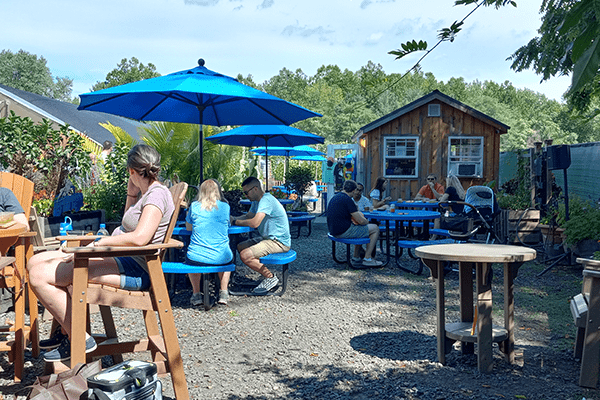|
RCBJ-Audible (Listen For Free)
|
Neighbors Fighting The Cidery Do Not Want To Post A Bond
By Tina Traster
The tortured legal dispute over the continued operations of Rockland Cider Works at the Van Houten farm in Orangeburg continued this week in Rockland County Supreme Court, leaving just about every party up in the air.
At the Jan. 25th hearing, Justice Christie D’Alessio told both Rockland Cider Works and a group of disgruntled neighbors trying to close it down to file additional papers to hash out their arguments in much greater detail.
Last week, the neighbors won a temporary restraining order, which would have shuttered the cidery. However, the victory came with strings: the neighbors were to post a bond of a to-be-determined amount to protect the cidery in case the business prevailed in the case.
Last July, the plaintiffs filed a lawsuit in Rockland County Supreme Court against Rockland Cider Works, the company’s landlord the Van Houten Farm Market Benefit Trust, the Town of Orangetown, and the New York State Liquor Authority hoping to shut down the farm cidery.
The thirteen plaintiffs on Wednesday, which include neighbors Susan McWhinney and Gerard Goggin, who live on an adjoining property to the Van Houten Farm at 68 Sickletown Road in Orangeburg, balked at the idea of posting a bond. The plaintiffs claim the cidery is violating the town’s zoning and building codes, creating a nuisance, and degrading neighboring property values. The suit sought a temporary and permanent injunction against its continued operation.
Prior to this week’s hearing, the cidery requested that the plaintiffs post a $3.5 million bond to cover $1.5 million in lost profits and $2 million to compensate for inventory and equipment that would sit fallow. The cidery also asked the court to “stay” or defer enforcement of its order while the case continues and the cidery pursues an appeal. By not entering a bond amount, the court effectively threw the cidery a lifeline, for now.
In response, the neighbors asked the court to waive the bond requirement, claiming they were acting on behalf of the Town of Orangetown, which they say has failed to enforce its own zoning laws. Because towns are not required to post bonds, the neighbors argue, they told the judge they shouldn’t have to.
“RCW offered the testimony of Darin Van Houten, (the cidery’s owner), but provided no evidentiary support for any of RCW’s claims of potential damages,” said attorney Donald Feerick, who is representing the neighbors. “As argued in our client’s pre-hearing memorandum of law, we believe the Court should rule that a business that is non-compliant with the local zoning code will not be permitted to carry on or continue operations that violate law.”
Additional arguments before D’Alessio are expected to be heard in February.
The case stemmed from a provision in the law that allows taxpayers in the same zone as the cidery to go to court to enforce the zoning laws when the town fails to act. The cidery is operating in a residential (R-40) zone that does not allow retail cidery operations.
The neighbors also argued that because the cidery is allegedly operating “illegally” they aren’t entitled to a bond to protect their profits.
“The court’s order conditioned the preliminary injunction upon the plaintiffs’ posting of a “good and sufficient” undertaking,” said Lino J. Sciarretta, the attorney who is representing Rockland Cider Works. “Yesterday, we appeared before the Court and presented testimony as to what the amount should be; we await the court’s decision.”
On Facebook this week, the cidery posted an announcement that said: “The Sun is Setting on the Future of our Local 70-year-old Farm.”
The farm owners expressed both shock and sadness over a series of recent legal decisions handed down by the court.
“Our legal complaint against the Town for not acknowledging our farm cidery as an agricultural business was dismissed by a judge who had not even been assigned to our case. Unfortunately for all parties involved, the judge did not weigh on the validity of our arguments or decide if our cidery was legal or not, but instead dismissed the case on a procedural issue. This decision, which we have appealed, was surprising and disappointing, not to mention wrong, in our opinion, particularly when the prior judge, after weighing the validity of our arguments, ruled in favor of our request for a preliminary injunction against the Town.”
The labyrinthine case has not only pitted a group of neighbors against a commercial enterprise; it has also spotlighted the Town of Orangetown’s unwillingness to take decisive action on a business that it determined was not properly zoned. Judge Thomas Zugibe in his recent decision has said Rockland Cider Works is not compliant within the town’s codes, and he believed the plaintiffs demonstrated that the business’s bar and restaurant has diminished the neighbors’ property values and interfered with their quality of life.
Prior to filing its complaint with the court, the cidery submitted two separate zoning petitions to the Town Board which were never acted upon














